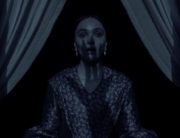In this new supernatural romance film, an isolated, directionless young American named Evan (Lou Taylor Pucci) flees to Italy to find himself. It’s obvious that he needs a chance to make a fresh start in new surroundings. He’s a fairly nondescript American twentysomething, whose ideas, confidence, and interests don’t seem to have evolved much past the level of a typical college sophomore. This makes sense, since he dropped out of school around that age to tend to his cancer-stricken mother and has been locked into that phase since.
Italy is not portrayed as the lush whirlwind of escapist bliss Evan may be after, but in a much more muted light in keeping with the subdued feeling of the entire movie. Evan’s experience of Europe is mostly confined to grimy hostels, bumming around with obnoxious, blustery travelers in their rented cars, smoking cigarettes, and talking about his frequent bar fights. The more things change, the more they stay the same.
Until one night at a bar, when Evan sees an impossibly beautiful Italian woman somehow unaccompanied, and he makes a move. Louise (Nadia Hilker) propositions him after a minute of chatting, to his surprise. He finds that Louise is surprisingly alone in the world and seems to be equally in need of companionship. Of course, he loves her because she is beautiful and represents a total chance at renewal, something completely separate from his sad, drab old life, and Louise accepts Evan as a nonthreatening, loyal companion.
Subsequently, we are treated to scene after scene of them sitting at a table, mumbling exposition to each other, which might not be so bad if the sound design was richer and if they had more interesting, expressive voices. The story turns into a version of Before Sunrise, but with little of the philosophical weight or energy, since Spring aims to be a genre film, not a film really delving into the humanistic nitty-gritty. Unfortunately, it isn’t really a genre film either, and it ends up caught in a forgettable middle ground.
Eventually, Louise, a geneticist specializing in degenerative disease, shows signs of some kind of horrid mutation, which she keeps hidden from Evan for as long as possible. The transformation gets explained in a very quick burst of dialogue, and that’s it. (I won’t spoil it, but it’s fairly clever, although very minimally developed.) It is a nice touch to have Louise as the expert on her own supernatural condition, rather than an outside expert like in so many supernatural films (Sinister, Dark Skies, Insidious). The level of logic behind the explanation really only serves to make you want more clarification of the fantasy logic, which never comes.
Spring is being marketed as something of an indie horror romance, but that is a bit misleading. There are hardly any elements of horror to be found here. It’s more like a muted, indie take on Avatar. As the film marches toward its conclusion, a feeling of dutifully following through on the promise of the initial concept takes over. Any kind of suspense, tension, or morbidity is out the window after the midway point, but even the romantic elements are seriously undercut by Louise’s ultimately benignly indifferent attitude toward Evan.
Not serious or perceptive enough to work as lite Richard Linklater/Noah Baumbach/Joe Swanberg fare, yet not as committed to genre to work in a fun way like the recent It Follows or 2009’s Splice, Spring will disappoint romance fans or horror fans. The actors likely won’t be compelling enough to win over audiences in lieu of making good on the romance or horror premise.
Spring’s only real fans will probably be critics, who will applaud the dutifully complete execution of the intriguing premise, the evident stretching of limited resources to make a movie that looks and feels richer than it is, and the bold lack of obligation the filmmakers felt to hit any of the familiar, pleasing notes of romance or horror that might draw viewers to it in the first place. Only a high concept genre mash-up this lifeless and plodding could have such a healthy Rotten Tomatoes score.

















Leave A Comment